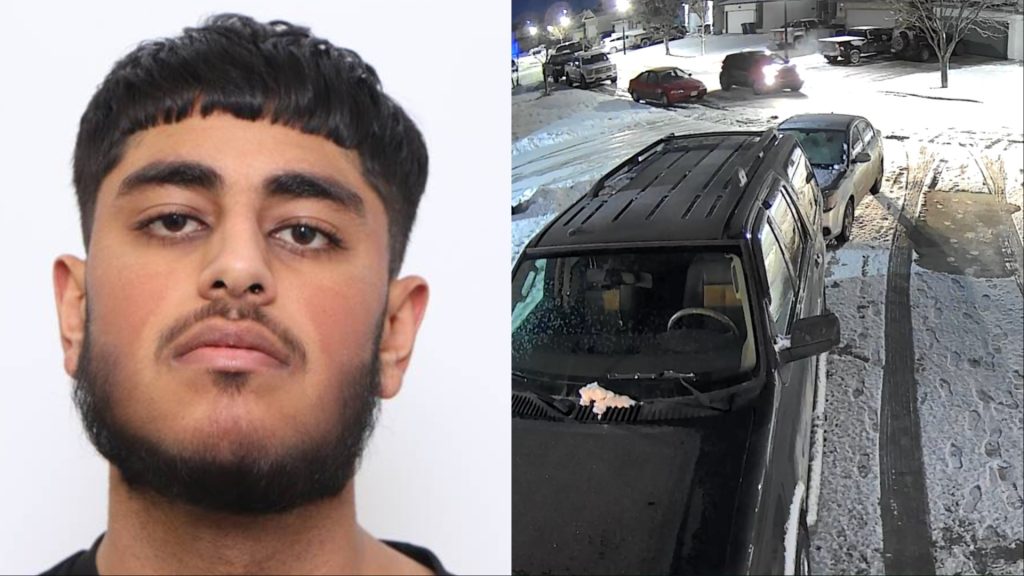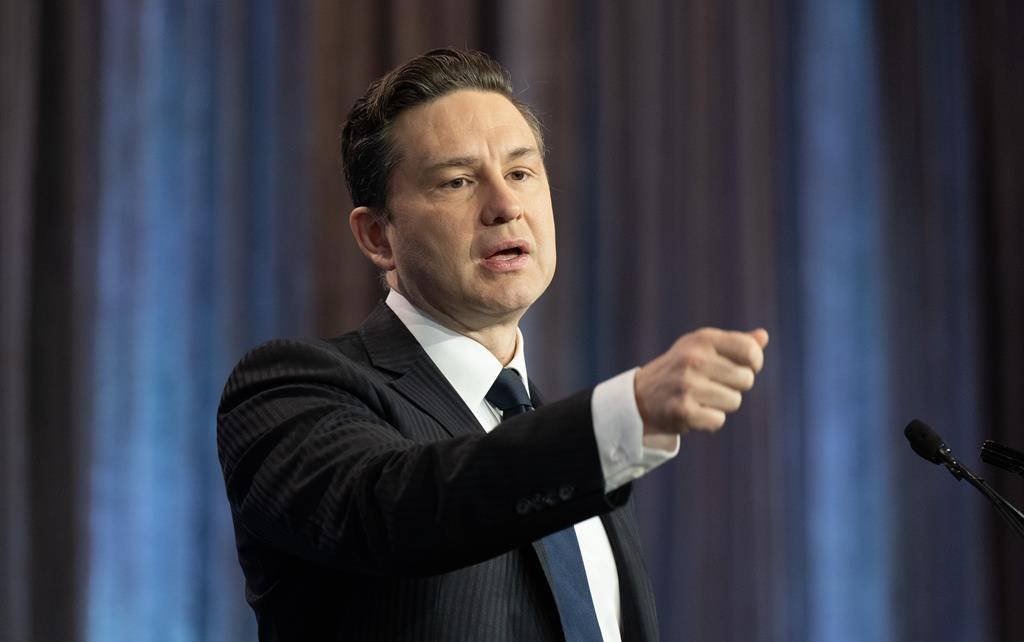Alberta Premier won’t impose mask mandates as school absences rise
Posted November 14, 2022 6:09 pm.
Last Updated November 15, 2022 3:40 pm.
Alberta Premier Danielle Smith says she won’t impose mask mandates as illnesses strike the province causing absences to rise in schools.
Smith told reporters Monday in Sherwood Park that masking is a personal choice and she respects people’s right to choose them, but will not force or impose them.
“Anyone who feels comfortable to wear a mask should wear a mask. That should be a personal choice,” Smith said.
“But we are not going to be mandating masks. We heard loud and clear from parents that they want a normal school environment for their kids, and we are going to let kids be kids.”
Smith’s comments fall short of the message Ontario’s top doctor is sending out, who “highly recommends” masking in all indoor settings, including schools, as a way to relieve the healthcare system.
As more Alberta kids get sick and miss school, Alberta’s opposition NDP is calling on the governing UCP to address the widespread shortage of children’s pain medication and the long wait times at children’s hospitals in both Calgary and Edmonton.
“Like many parents, I have a constant knot of anxiety in the pit of my stomach about my kids needing medical support and it not being there for them when they need it, and now I worry I also don’t have the tools that I need to keep them safe at home. This is unacceptable, this is not what any parent or child should be facing in our province,” Rakhi Pancholi said, Alberta’s official opposition critic for children’s services who says she has kids at home sick.
Alberta’s former chief medical officer of health, Dr. James Talbot says Alberta is seeing a surge in illness due to young children not being exposed to respiratory viruses because of the precautions taken against COVID over the past few years.
“There is this big surge in what are normally fairly innocuous diseases, but there are all of these serious outcomes, and the more people that get infected, the more pressure you’d expect on hospitals,” Talbot said.
He says masking in school environments could help ease the healthcare system.
Meanwhile, Smith says her biggest concern is the shortage of children’s Tylenol having a domino effect on hospital wait times.
“I’m going to do what I can to make sure they have the medications they need, and heaven forbid if they need to go to the hospital, they aren’t waiting an excessively long time to get their child seen,” she said.
Smith adds hospital wait times are unacceptable, and will be addressing those issues later this week. Prime Minister Justin Trudeau tweeted Monday saying Ottawa has secured foreign supply of acetaminophen for kids and “will be working with manufacturers, distributors, provinces, territories, hospitals, and others to increase supply and to keep all of our kids safe and healthy.”
Update: We’ve secured foreign supply of acetaminophen for kids – and it’ll be available for sale at stores and in pharmacies as soon as possible. @GovCanHealth has also approved the importation of ibuprofen and acetaminophen so hospitals have the supply they need, too.
— Justin Trudeau (@JustinTrudeau) November 14, 2022
She says her focus is on other illnesses going around, along with reducing hospital wait times.
Smith also said, despite a court ruling made in early November saying the province was “unreasonable” in lifting masking mandates, that she will “retain the full authority to be offering that advice at the provincial level.” She has said the province would look into appealing that decision.
This comes as Alberta schools are seeing high rates of absenteeism due to the wave of illnesses like RSV, the flu, and COVID-19 sweeping across the province.
The Calgary Board of Education (CBE) told CityNews it has seen a spike in absences due to illness over the last nine school days.
It reports around 12 per cent of K -12 students are missing school, along with around seven per cent of teachers.
Edmonton Public Schools report around 13 per cent of students in their schools are absent due to other illnesses, while 0.08 per cent are absent “likely due to COVID-19.”
In addition, the Calgary Catholic School District says that 28 per cent of their 110 schools, or around 30 schools, are reporting over 10 per cent of its students are absent due to illness.
If a school experiences higher than 10 per cent absenteeism, AHS is then notified and works with the school to provide a letter and information directly to families.
The CBE says 15 per cent of its schools, which is around 36 schools, have exceeded 10 per cent.
Related Stories:
-
Smith vows to ban mask mandates in Alberta schools; explores appeal of judge’s ruling
-
Alberta government would be ‘irresponsible’ to fully ban masking in schools: ATA
Wing Li with Support Our Students Alberta, says the province needs to step in and help teachers and school boards.
“[We’ve] reached the threshold of absenteeism which is not something we’ve seen before because we used to track COVID-specific case numbers and schools,” Li said.
“We know this is a group of different illnesses, so a lot of factors [are] just combining to make the perfect storm right now.”
She also says that with online learning no longer an option, more students are feeling the stress of missing class and falling behind.
“The province needs to have a plan because all districts are being affected right now. So leaving it up to individual school boards is actually very inefficient, and there’s going to be gaps in what the school board can do.”
Smith says that the shortage of children’s medication is something that is more concerning for the UCP and will resort to compounding pharmacies to ensure parents receive medication for their children.
There are 100 compounding pharmacies in Alberta. Pharmacists make the medication in lieu of mass-produced pharmaceuticals.
“Parents want to see that they’ve got the medication there when their kids get sick and that if their kids need to go to hospital that they’re not waiting hours and hours,” Smith said.
While some parents are asking for mask mandates in schools, Minister of Education Adriana Lagrange says that no school boards have reached out to her to implement such a mandate.
“We’re always concerned about the safety and security of our students and our staff members, we will continue to do what’s best for our students,” LaGrange said.
The province has gone back to pre-pandemic reporting, and Smith says there should be no cause for panic.
“Now that we know more about the virus, we are returning to treating it and other viruses as endemic,” Smith said.
“I think it’s important that we not cause an overreaction or a state of panic. We want people to know that we take this seriously. But we also want to do the things that we know are going to help.”
Smith has consistently blamed both Hinshaw and AHS for failing to deliver what she says was proper advice and care for Albertans as the hospital system almost crumbled in the multiple waves of the COVID-19 pandemic.
Related Stories:
-
Alberta names new chief medical officer
-
Alberta Premier Danielle Smith to accept ‘invitation’ with former Trump administration doctor
-
Smith vows to ban mask mandates in Alberta schools; explores appeal of judge’s ruling
She also announced earlier this month that her team of medical advisers was linking up with Dr. Paul Alexander and that she was “interested in hearing what he has to say.”
The premier has said she supports COVID-19 documents like the Great Barrington Declaration, which has been dismissed by Hinshaw and the World Health Organization as scientifically unsound.
The declaration urges protecting the old and frail but otherwise letting COVID-19 run free to build up herd immunity and keep society operating while preventing the longer-term consequences of isolation on people’s mental health. Sweden, Florida, and South Dakota used this approach during COVID-19 at the expense of comparatively higher COVID-19 case and death rates.
During the COVID-19 pandemic, Smith pushed for later-debunked treatments such as the livestock dewormer, Ivermectin.
She also came under fire in her first week as premier when she called unvaccinated people the “most discriminated” against group she’s come across in her lifetime.







